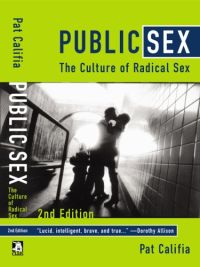Patrick Califia: Difference between revisions
mNo edit summary |
No edit summary |
||
| (10 intermediate revisions by 3 users not shown) | |||
| Line 1: | Line 1: | ||
'''Patrick Califia''' is | __NOTOC__[[File:Public_Sex.jpg|thumb|200px|Cover]]'''Patrick Califia''' (now "Pat Califia") is a [[Transgender youth and attraction to minors|trans]] LGBTQ activist and writer who has written sympathetic and non-sensational articles about MAPs and [[Minor-adult sex|age-disparate sexual activity]]. | ||
:'' | Califia wrote for [[Daniel Tsang]]'s 1981 [[The Age Taboo]], and was published in [[Paidika]]: The Journal of Paedophilia (Feminism, Pedophilia, and Children's Rights - 1991<ref>[https://www.ipce.info/ipceweb/Library/califa_feminism.htm Feminism, Pedophilia, and Children's Rights]</ref>). She is associated and friends with [[Queer Theory]] founder [[Gayle Rubin]]. | ||
==Publications== | |||
[[Category:Official Encyclopedia]][[Category:People]][[Category:People: Academics]][[Category:People: Critical Analysts]][[Category:People: American]] | *[http://www.ipce.info/ipceweb/Library/art_ess_c.htm '''Public sex: The Culture of Radical Sex'''], 1994: | ||
<blockquote> | |||
''Minors who are given the power to say “no” to being sexually used by an abusive parent or relative are also going to assume the right to say “yes” to other young people and adults whom they desire. You can't liberate children and adolescents without disrupting the entire hierarchy of adult power and coercion and challenging the hegemony of antisex fundamentalist religious values.'' | |||
</blockquote> | |||
*[https://libgen.is/book/index.php?md5=AF87C73FBC6BEB5609991E964EF688EB '''Public Sex: The Culture of Radical Sex'''], 2000 (2nd edition): | |||
The second edition emphasized an [[anti-contact]] view (the author wrote about shift in her view of possibility of consent since the 1st edition), and contained articles with subtle reflections on minors' sexuality, anti-pornography movement, the new puritanism and [[right-wing]] feminism, and political repression of sexuality. The publisher's description of the 2nd edition: | |||
<blockquote> | |||
''Public Sex collects the best of Pat Califia's work published over the past 20 years. Providing both a chronicle of the radical sex movement in the United States, as well as the definitive opinions of America's most consistent and trenchant sexual critic, Public Sex is must-read material for anyone interested in sexual practices, feminism, censorship, or simply the art of the political essay.'' | |||
</blockquote> | |||
==References== | |||
[[Category:Official Encyclopedia]][[Category:People]][[Category:People: Academics]][[Category:People: Critical Analysts]][[Category:People: American]][[Category:Pubs: Books]] | |||
Latest revision as of 09:58, 17 March 2024

Patrick Califia (now "Pat Califia") is a trans LGBTQ activist and writer who has written sympathetic and non-sensational articles about MAPs and age-disparate sexual activity.
Califia wrote for Daniel Tsang's 1981 The Age Taboo, and was published in Paidika: The Journal of Paedophilia (Feminism, Pedophilia, and Children's Rights - 1991[1]). She is associated and friends with Queer Theory founder Gayle Rubin.
Publications
Minors who are given the power to say “no” to being sexually used by an abusive parent or relative are also going to assume the right to say “yes” to other young people and adults whom they desire. You can't liberate children and adolescents without disrupting the entire hierarchy of adult power and coercion and challenging the hegemony of antisex fundamentalist religious values.
- Public Sex: The Culture of Radical Sex, 2000 (2nd edition):
The second edition emphasized an anti-contact view (the author wrote about shift in her view of possibility of consent since the 1st edition), and contained articles with subtle reflections on minors' sexuality, anti-pornography movement, the new puritanism and right-wing feminism, and political repression of sexuality. The publisher's description of the 2nd edition:
Public Sex collects the best of Pat Califia's work published over the past 20 years. Providing both a chronicle of the radical sex movement in the United States, as well as the definitive opinions of America's most consistent and trenchant sexual critic, Public Sex is must-read material for anyone interested in sexual practices, feminism, censorship, or simply the art of the political essay.